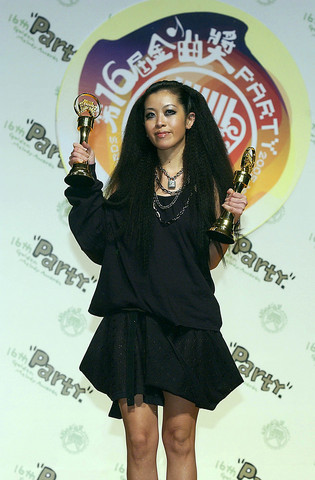By the time the Golden Melody Awards had finished late Saturday night, the event that had developed a reputation in recent years for monotony and predictability ended up stunning audiences by handing the three top awards to some of the darkest horses on the nominee list.
Perhaps the greatest shock of them all was the Best Album award going to Sandee Chen (
Also surprising was the conspicuous absence of Jay Chou taking the stage on the receiving end of an award. He won the top album awards in 2002 and last year and this year released the best-selling album in Mando-pop titled Common Jasmine Orange (

PHOTO: TAIPEI TIMES
Before Saturday, the safe money would have been on Chou taking at least two awards, but this year's Golden Melody was different in more ways than just this one.
Beating the heavyweights Chou and Wang Lee-hom in the Best Mandarin Male Singer category was Stanley Huang (
The crowded list in the Best Mandarin Female Singer category included Chang Hui-mei (
Chang Hui-mei, also known as A-Mei, was sent packing once again without a trophy as she has every year since she's been nominated.
The biggest winners of the night ended up being Sheng Xiang and Water 3 (
One of the most memorable moments of the night was the announcement for the Best Male Mandarin Singer award, which was read by Karen Mok. Speaking in Mandarin with her Hong Kong accent, Mok's pronunciation of the first two characters of Stanley Huang's name sounded indistinguishable from the first two characters of Wang Lee-hom's name, creating a painfully awkward scene in which both singers stood and began congratulating each other and thanking everyone around them. Wang even leaned in close to the TV camera winking and saluting and then rushed onto the stage, where he was told that it was, in fact, Stanley, walking a few steps behind him, who was the actual recipient. Visibly embarrassed, he skipped off stage, but received a conciliation hug from super-model Lin Chih-ling (
From the perspective of the press pit, the ceremony in years past had taken on the qualities of a comedy, as bloopers like the one Mok provided Saturday night abounded. But this year's ceremony was also remarkable for its mercifully short and entertaining performances -- a major break from the past. The addition of Patty Hou (

Following the shock complete failure of all the recall votes against Chinese Nationalist Party (KMT) lawmakers on July 26, pan-blue supporters and the Chinese Communist Party (CCP) were giddy with victory. A notable exception was KMT Chairman Eric Chu (朱立倫), who knew better. At a press conference on July 29, he bowed deeply in gratitude to the voters and said the recalls were “not about which party won or lost, but were a great victory for the Taiwanese voters.” The entire recall process was a disaster for both the KMT and the Democratic Progressive Party (DPP). The only bright spot for

Water management is one of the most powerful forces shaping modern Taiwan’s landscapes and politics. Many of Taiwan’s township and county boundaries are defined by watersheds. The current course of the mighty Jhuoshuei River (濁水溪) was largely established by Japanese embankment building during the 1918-1923 period. Taoyuan is dotted with ponds constructed by settlers from China during the Qing period. Countless local civic actions have been driven by opposition to water projects. Last week something like 2,600mm of rain fell on southern Taiwan in seven days, peaking at over 2,800mm in Duona (多納) in Kaohsiung’s Maolin District (茂林), according to

Aug. 11 to Aug. 17 Those who never heard of architect Hsiu Tse-lan (修澤蘭) must have seen her work — on the reverse of the NT$100 bill is the Yangmingshan Zhongshan Hall (陽明山中山樓). Then-president Chiang Kai-shek (蔣介石) reportedly hand-picked her for the job and gave her just 13 months to complete it in time for the centennial of Republic of China founder Sun Yat-sen’s birth on Nov. 12, 1966. Another landmark project is Garden City (花園新城) in New Taipei City’s Sindian District (新店) — Taiwan’s first mountainside planned community, which Hsiu initiated in 1968. She was involved in every stage, from selecting

As last month dawned, the Democratic Progressive Party (DPP) was in a good position. The recall campaigns had strong momentum, polling showed many Chinese Nationalist Party (KMT) lawmakers at risk of recall and even the KMT was bracing for losing seats while facing a tsunami of voter fraud investigations. Polling pointed to some of the recalls being a lock for victory. Though in most districts the majority was against recalling their lawmaker, among voters “definitely” planning to vote, there were double-digit margins in favor of recall in at least five districts, with three districts near or above 20 percent in